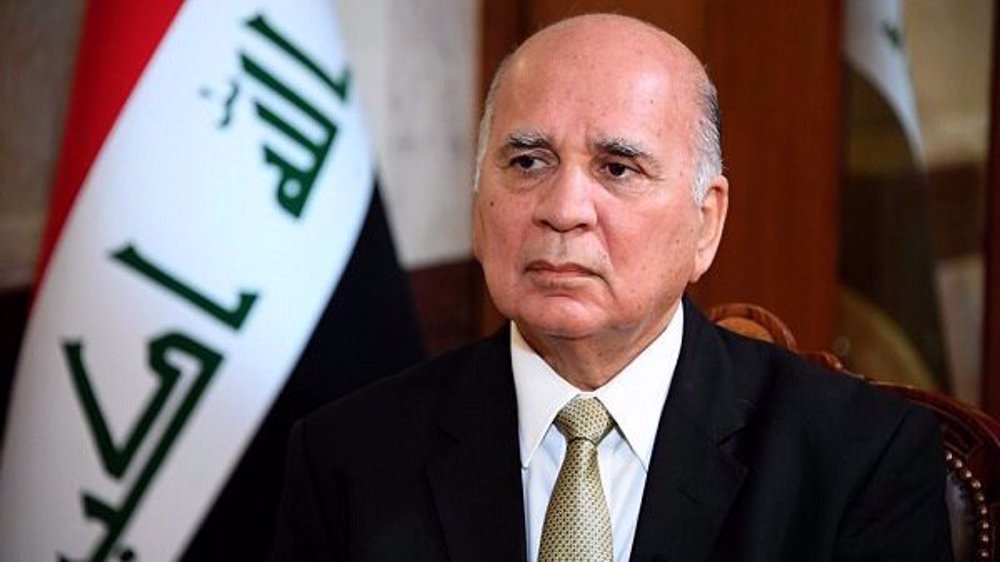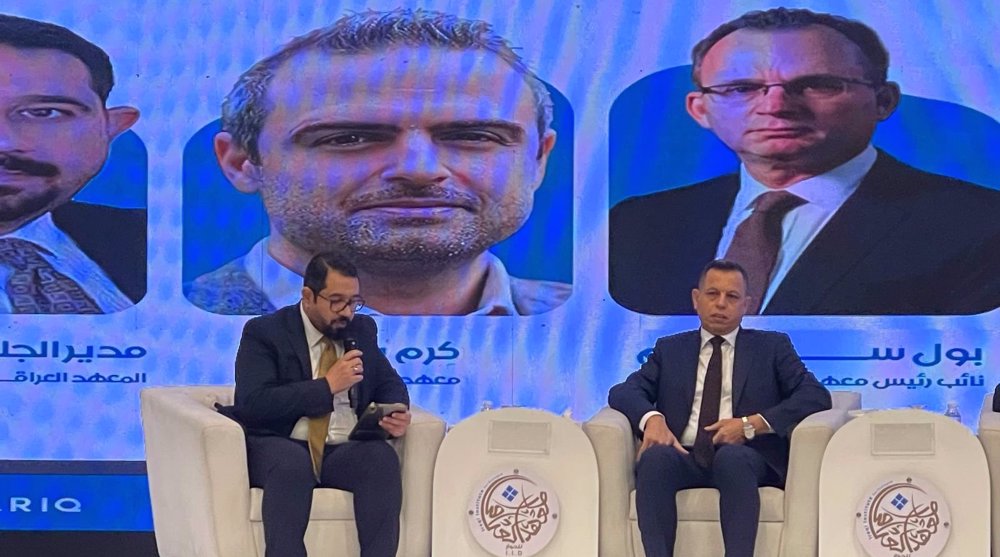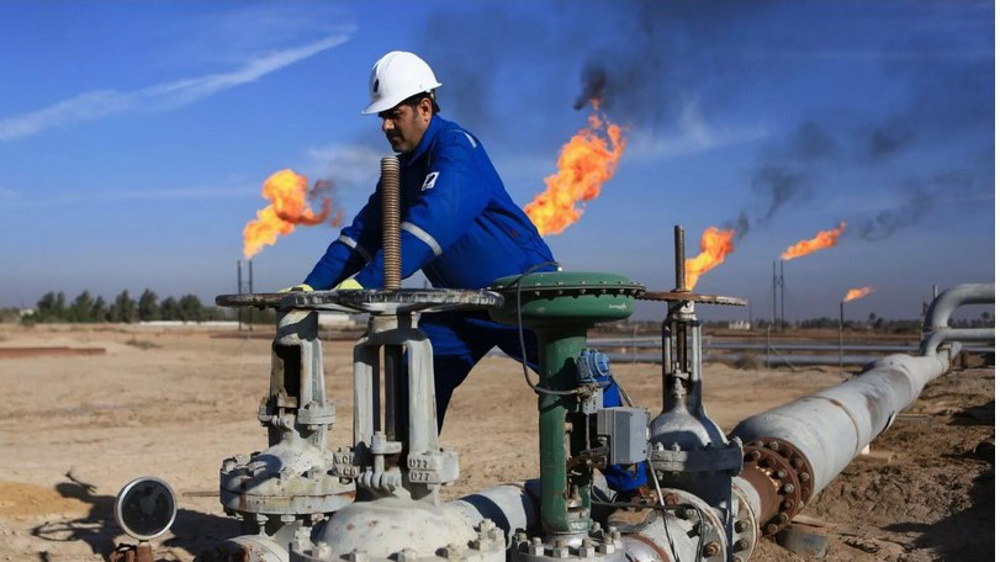Iraq does not allow creation of ethnic govt. in country: Abadi
Iraqi Prime Minister Haider al-Abadi says Baghdad will not allow the creation of an “ethnic government” in the Arab country as the Iraqi Kurdish region prepares for a highly controversial planned referendum on its independence on Monday.
The Iraqi premier made the remarks in a televised address on Sunday, a day before the Kurdistan Regional Government (KRG), led by Massoud Barzani, is to hold a contentious plebiscite on independence of the semi-autonomous Kurdish region.
Abadi also vowed that the Iraqi leaders would not allow the Arab country to return to “dark times” of the past, promising that he would also take the “necessary measures” to protect the unity of Iraq.
“Taking a unilateral decision, which can affect the unity of Iraq and its security and the security of the region, through a referendum on separation, is unconstitutional and against civil peace. We will take the necessary measures to preserve the unity of the country," the Iraqi prime minister said.
Abadi also stated that Baghdad would not “abandon” the Kurdish citizens, saying, “Iraq will remain for all Iraqis. We will not allow it to become a possession of one or the other, and we will not permit anyone to play with Iraq and not pay the consequences.”
The planned referendum has raised fears of a fresh conflict in the region, which is trying to emerge from years of a campaign of death and destruction by the Daesh Takfiri terrorists.
The international community and the regional countries alike are strongly opposed to the referendum, saying the partitioning of Iraq could touch off a fresh bout of violence across the region.
Abadi also criticized the Kurdish leaders for taking some 25 percent of the revenues that Iraq raises through exporting crude oil, saying they had not even paid salaries to employees and workers in the Kurdish region despite their hefty oil revenues.
The Iraqi prime minister added that Kurdistan’s problems were mostly of a domestic nature and the situation in that region would deteriorate as a result of the wrong and unwise decisions of its leaders.

Barzani: Partnership with Baghdad has failed
Earlier on Sunday, Barzani said at a press conference in Erbil that his people’s partnership with the central government in Baghdad was over, calling on “all Kurds” to go to the polls “in peace” on Monday.
“The partnership with Baghdad has failed and we will not return to it. We have reached the conclusion that independence will allow us not to repeat past tragedies,” Barzani said.
The Kurdish leader further stated that the plebiscite was just the first stage in the effort made by the Kurdistan region to express its opinion, adding, “After that, a long process will begin.”
“The referendum is not for defining borders or imposing a fait accompli. We want a dialogue with Baghdad to resolve the problems, and the dialogue can last one or two years,” Barzani added, in reference to disputed zones such as oil-rich Kirkuk province.
Kirkuk is not one of the three provinces that have made up the semi-autonomous Kurdish region in Iraq since 2003. However, Kurdish militants used a vacuum created when government troops were fighting against Daesh to overtake city of Kirkuk.
The United States has already expressed its opposition to the referendum, arguing that it would weaken the joint Arab-Kurdish military operations that have managed to make Daesh retreat in both Iraq and neighboring Syria.
The White House has also warned that holding the vote in “disputed areas” would be “provocative and destabilizing,” urging leaders of the Kurdistan region to call off the referendum and begin serious and sustained negotiations with Baghdad.
In a statement on September 18, United Nations Secretary General Antonio Guterres urged Iraq’s Kurdish leaders to scrap the vote, saying it would undermine the ongoing battle in the Arab country against Daesh.
Iran has also announced that it is opposed to the “unilateral” scheme for the independence of the Iraqi Kurdistan, underlining the importance of maintaining the integrity and stability of Iraq and insisting that the Kurdistan region is part of the majority Arab country.
Earlier on Sunday, Iran also closed its airspace to all flights to and from the Kurdish region at the request of the Iraqi government.
On September 16, Ali Akbar Velayati, a senior advisor to Leader of the Islamic Revolution Ayatollah Seyyed Ali Khamenei on international affairs, expressed the Islamic Republic’s opposition to the referendum, warning that separatist moves in the region would ultimately serve the interests of the US and the Israeli regime.
“The Islamic Republic of Iran opposes any move either knowingly or unknowingly towards independence of one part of Iraq or any other country in the region,” Velayati added.

Iraq asserts commitment to security agreement with Iran

Iraq warns Syria over security threats posed by Daesh remnants

Iraq denies it is resuming oil exports from Kurdistan under US pressure
Houthi: Yemen ready to attack Israel if Gaza truce breaks down
VIDEO | Lost classrooms, lost childhoods: Jenin’s children struggle for education
VIDEO | Palestinians ramain steadfast despite Israel’s onslaught
VIDEO | Press TV's news headlines
Iran ready to strengthen ties with UAE based on ‘mutual interests’: Deputy FM
VIDEO | A slap in the face of imperialism
Iran remains steadfast in its ‘principled positions,’ says Foreign Ministry
VIDEO | Holding on to hope: Gazans welcome Ramadan despite hardship











 This makes it easy to access the Press TV website
This makes it easy to access the Press TV website